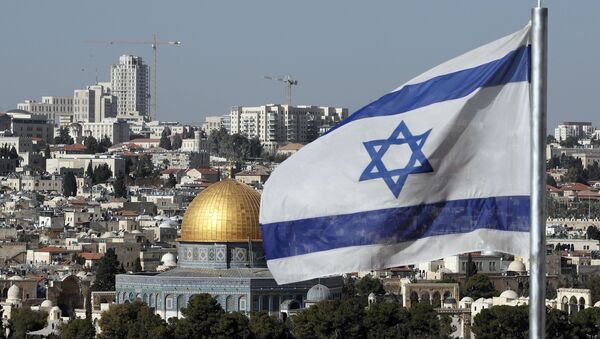On August 13, US President Trump announced that the United Arab Emirates (UAE) and Israel had struck a peace agreement dubbed "the Abraham Accord". The UAE has become the third Arab country and the first Gulf nation to formally normalise diplomatic ties with the Jewish state.
"Everybody said this would be impossible. After 49 years, Israel and the United Arab Emirates will fully normalise their diplomatic relations", Trump told journalists, expressing hope that "now that the ice has been broken" more Arab and Muslim countries "will follow the United Arab Emirates".
UAE-Israeli Rapprochement
"The economic and the political aspects of this peace treaty are tremendous. This is a historical move", admits Avigdor Eskin, Israeli publicist and political commentator.
For those who are closely monitoring Middle Eastern affairs, the historic deal has not come as a bolt from the blue: according to the Council on Foreign Relations (CFR), a US influential think tank, the two countries "have been inching toward normalisation in recent years".
Thus, in 2015, Israel opened a diplomatic office in Abu Dhabi, while Israeli officials, businessmen and athletes have taken part in UAE events for some time.
The timing of the agreement coincided with Prime Minister Netanyahu's decision not to kick off the process of incorporation of Judea and Samaria – a Biblical name for the West Bank – on 1 July, contrary to initial plans. Earlier, on 12 June, UAE Ambassador to Washington Yousef Al Otaiba warned the Jewish state against taking over the region, which is seen by Arab states as "illegally occupied" Palestinian territories.
"Recently, Israeli leaders have promoted excited talk about normalisation of relations with the United Arab Emirates and other Arab states. But Israeli plans for annexation and talk of normalisation are a contradiction", the ambassador wrote in his op-ed for Israeli newspaper Yedioth Ahronoth.
According to Emirati officials, the new normalisation deal brought the incorporation to a full stop; however, Netanyahu made it clear that the extension of Israel's sovereignty to Judea and Samaria is still on the table, though temporarily suspended.

Palestinian Issue is 'Losing Relevance'
The UAE-Israeli deal would not stop the formal accession of the West Bank to the Jewish state, quite the contrary, Eskin believes.
"The issue of declaring Israeli sovereignty over some parts of Judea and Samaria (formally, the West Bank in the Kingdom of Jordan) is becoming more natural than ever", he says. "The peace treaty between Israel and the UAE manifests the recognition in the Arab world of the passing value of the quest for the Palestinian state."
The publicist suggests that "this is not a change in the basic Arab perception, but the renewed realistic look at the reality".
"Once we used to hear that the Palestinian issue is the core of the whole problems of the Middle East", Eskin recollects. "But as we see, the Iran-Iraq War, the war in Syria, in Libya, in Yemen – all these bloody events had nothing to do with Israel and with the Palestinian problem. Therefore, the further Arab recognition of this simple reality will make it easy for Israel to act there legally."
While the major Palestinian political and militant organisations unanimously denounced the UAE-Israeli deal, it appears that "the Emiratis do not want to subordinate their national interests to an ineffectual and corrupt Palestinian leadership", as CFR presumed.
Furthermore, the Abraham Accord was publicly praised by Bahrain, Egypt, Jordan, and Oman. It is expected that Bahrain and Oman may follow the UAE's lead.
"We are likely to see more Gulf States signing peace treaties with Israel", Eskin says, adding that Morocco could consider the same.
These covert diplomatic processes are underway, with Mossad, the national intelligence agency of Israel, playing a significant role in establishing foreign ties, according to the publicist.
"One of the tasks of the Mossad is to promote peace with the Arab leaders and to keep secret negotiations instead of the cocktail parties of foreign ministries", Eskin highlights. "This was since the time of David Ben-Gurion, the first head of the state of Israel."

Saudis Remain Silent
Meanwhile, the question of whether the Saudis will strike a peace agreement with the Jewish state still remains open, according to the Israeli publicist.
"There is quiet cooperation going on, but the official peace deal? People can only guess", he remarks.
Though Riyadh has remained silent about the UAE-Israeli accords, "the kingdom has already cultivated covert ties with Israel in recent years", notes The Times of Israel, admitting that the initiative was spearheaded by Crown Prince Mohammed bin Salman.
According to the media outlet, Saudi Arabia's bold Vision 2030 plan requires Israel's expertise in various areas ranging from manufacturing and biotechnology to cybersecurity. Still, being home to Mecca and Medina, Islam's holiest sites, Saudi Arabia is likely to tread carefully before formally normalising relations with the Jewish state.
Iran, Qatar & Turkey Up in Arms About the Deal
Meanwhile, Iran, Qatar and Turkey openly lashed out at the Emiratis for the Abraham Accord, calling the deal a "betrayal" of Palestinians and all Muslims and a "stab in the back".
However, according to Eskin, it is Turkey and Iran who have prompted the UAE and some other Arab states to seek normalisation with Israel.
"The concern about Iranian expansion was one of the catalysts for this peace deal", the Israeli publicist suggests. "Turkey is also a matter of serious concern. The idea to revive the Ottoman Empire is not acceptable for the Arab world."
Previously, there was an understanding that it was the US who carried out the task of "deterrence and stabilization" in the region, Eskin recalls. However, Washington is slowly but steadily losing interest in the Arab world for the simple reason of having developed American oil resources to the extent that it is now the number one oil producer in the world, according to the publicist.
Israel is geographically "closer" to the Arab world than the US; besides this, the Jewish state's military and technological capabilities are significant, the commentator underscores, presuming that owing to this, the Arab countries are seeking to boost ties with Israel, unlike Iran and Turkey.




